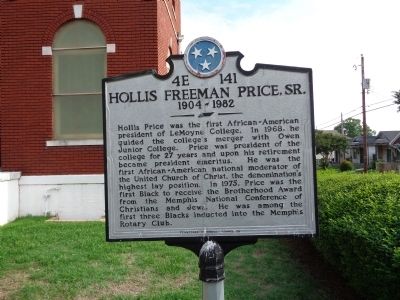8888888888888888888888888888888888888888888888888888888
Hollis Freeman Price
Hollis Freeman Price Sr. was born in Virginia in 1904 at the dawn of the Jim Crow era in the American South. Reared by parents who were prominent educators and devout Christians, young Price’s destiny as a future educator and religious leader was being molded well before he reached the shores of the bustling river city of Memphis. After receiving his primary education from the elite Williston Academy in East Hampton, Massachusetts, Price earned a bachelor’s degree from Amherst College in 1927 and a master’s in economics from Columbia University shortly thereafter. Equipped with a solid education and an intense desire to “uplift” his race, Price moved back South where he could better serve African Americans.
Hollis Price’s first professional opportunity came at the Tuskegee Institute, where he served as professor of economics for nearly sixteen years. At this small Alabama school made famous by its founder, Booker T. Washington, Price began to shape himself as an educational leader, which would eventually pay dividends for a number of African Americans that migrated from the Deep South to the Mid-South during the Great Migration of the early twentieth century. Along the way, Price met and married the future Mrs. Althea Price, who was an educator herself. This union produced one child, Hollis F. Price Jr., who later followed in his father’s footsteps by becoming an economist. With the focus of this country primarily on the troops that were serving in World War II, Price shifted his focus north to a small college in Memphis.
History was made in 1943, when Hollis Freeman Price Sr. became the first African American president of LeMoyne College. Quickly, Price cemented himself as a visionary in the Memphis community as he continually garnered financial support for this small black private college, a feat that many Historically Black College and University (HBCU) presidents found difficult during the war years.
With LeMoyne College in good standing, President Price decided to take a leave of absence in 1954 to raise funds for the Urban League. Price’s work as an educational and community leader did not go unnoticed as he received two honorary doctorates, the first from Brandeis University in 1958 and the second from Amherst College in 1962. As a result of his work with educational, religious, and social organizations, Price’s popularity in the Memphis community soared during the early 1960s. Nevertheless, he failed to secure enough votes to earn a seat on the Memphis City Board of Education in 1963.
Following the assassination of Civil Rights leader Dr. Martin Luther King Jr. in April 1968 in Memphis, Price’s leadership was lauded as he calmed his students during this tragic hour. As the Civil Rights movement continued in Memphis, LeMoyne College gained more students by successfully merging with Owen College, a small black junior college. The newly combined school became known as LeMoyne-Owen College. Price ultimately served as first president of this newly combined entity. Although there were no major retaliations from the black community during the spring of 1968, Price eventually faced angry students in the fall of that year. This protest was quickly terminated as the president met with student leaders and listened to their demands. The handling of this protest, the schools’ merger, and his overall educational prowess led the City of Memphis to honor Price as “Educator of the Year” in 1968.
Tennessee Governor Buford Ellington appointed Hollis Price to the Tennessee Education Council in 1969. After twenty-seven years of service to LeMoyne-Owen College, Hollis Freeman Price Sr. retired in 1970. Although retired as college president, Price began working as a producer and executive director of community affairs for WMC-TV, Channel 5 in Memphis. On November 6, 1982, Hollis Freeman Price Sr. died at his home at the age of seventy-eight. He is remembered as a man of wisdom, pride, and humility.
88888888888888888888888888888888888888888888888888888888888888888888888888888888888
Hollis Freeman Price Sr. (1904-1982) was a distinguished African American educator and community leader. Born in Virginia, he was raised by parents who were prominent educators. Price earned his bachelor’s degree from Amherst College and a master’s in economics from Columbia University1.
He began his career at the Tuskegee Institute and later became the first African American president of LeMoyne College in Memphis in 1943. Under his leadership, the college merged with Owen College to become LeMoyne-Owen College1. Price was known for his dedication to education and his community, receiving several honorary doctorates and awards throughout his career1.
Hollis F. Price Sr. passed away on November 6, 1982, at the age of 781. He is remembered for his wisdom, pride, and humility.
88888888888888888888888888888888888888888888888888888888888888888888888888
Hollis Freeman Price, Sr.
1904-1982
Inscription. Hollis Price was the first African-American president of LeMoyne College. In 1968, he guided the college's merger with Owen Junior College. Price was the president of the college for 27 years and upon his retirement became president emeritus. He was the first African-American national moderator of the United Church of Christ, the denomination's highest lay position. In 1975, Price was the first Black to receive the Brotherhood Award from the Memphis National Conference of Christians and Jews. He was among the first three Blacks inducted into the Memphis Rotary Club.
Erected by Tennessee Historical Commission. (Marker Number 4E 141.)
888888888888888888888888888888888888888888888888888888888888
Hollis F. Price: Uncommon Man, Educator, Leader
Hardcover
Published July 17, 2017
888888888888888888888888888888888888888888888888888888888888
888888888888888888888888888888888888888888888888888888888888
888888888888888888888888888888888888888888888888888888888888
888888888888888888888888888888888888888888888888888888888888

No comments:
Post a Comment